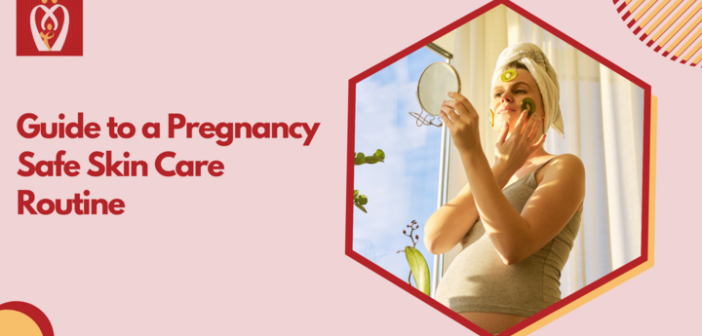When you find out you’re pregnant, everything changes. That includes your pregnancy care skin products, as well. This blog is all about Pregnancy Safe Skin Care Routine.
Even though it’s common knowledge that you’ll have to give up your favourite bottle of wine, giving up your go-to beauty care items may come as a surprise. When it comes to pregnancy care, skincare products are in the spotlight because some substances may be absorbed into your body and, by extension, into the body of your baby’s infant.
It’s fair to say that the majority of over-the-counter (OTC) body care products include no substances that might damage your child, but there are a few exceptions. So here’s the good news: you don’t have to choose between safeguarding your unborn child and preserving your glowing prenatal appearance.
As a pregnant woman, you may experience unwanted skin changes that may be reversed with the right product. If you’re curious about the safety of your current skincare routine, this guide will show you what to look for in a healthy pregnancy skincare routine and what components to avoid.
Skin changes
Pregnancy induced skin changes are common, let’s face it. It’s possible that hormones are at fault, or that it’s simply another “normal” peculiarity that comes with being a pregnant woman.
While some women have a flawless complexion for nine months, others have to deal with a new or worsening skin condition at some point. Among the most prevalent are:
- itchy skin
- increasing the pigmentation of the skin (a condition called melasma or cholasma)
- acne
- eczema, psoriasis, or acne may worsen in those who already have one of these disorders (for better or worse).
- stretch marks, spider veins, and hair growth
Pregnancy care: ingredients for healthy skin
Hyperpigmentation and acne
Some safe alternatives to utilising retinoid-based treatments while pregnant are available if you have a history of breakouts or are unexpectedly transported back in time to your teenage years. Glycolic acid is one of the most effective.
Pregnant women should avoid taking excessive doses of glycolic acid, although it is likely safe in the tiny levels found in over-the-counter skincare products. Glycolic acid, as well as related acids like azelaic acid, may lighten dark spots and reduce the appearance of fine wrinkles.
Anti-aging/wrinkles
Topical antioxidants, such as vitamin C, may safely promote your skin’s vitality by protecting it from harm and retaining collagen, just as they do inside to strengthen your immune system and fight off free radicals.
Stretch marks and dry skin
Pregnancy demands a lot of your body, and if your unborn child needs additional water at any moment, your body will provide it. Dry skin may be caused by this, as well as by changes in hormones.
In addition to consuming lots of water, moisturizing creams like coconut oil, cocoa butter, peptides, and hyaluronic acid (HA) may help with hydration. Stretch marks may be avoided by regularly moisturising the areas of your body that are most likely to be affected by pregnancy.
Sun protection
Protecting your skin from the sun’s harmful rays is one of the best ways to prevent wrinkles and skin cancer. But how can you keep your skin protected when pregnant is the real issue.
Try mineral-based sunscreens, which protect the skin by reflecting UV rays away from it. The decision on the safety of chemical broad-spectrum sunscreens is still pending. Zinc oxide and titanium dioxide are among the mineral-based sunscreen ingredients for pregnancy care.
For the sake of your child, you may have to give up some of your favourite skincare products.
Prescription retinoid-containing treatments are the most likely to cause serious congenital problems during pregnancy, according to research. This includes avoiding items that might be detrimental to you or your unborn child.
Opt for safe skincare ingredients for pregnancy care and know that you’re making better choices for your baby-to-be. In addition, consult with your GP or dermatologist about your unique skin-care issues and objectives throughout your pregnancy.




